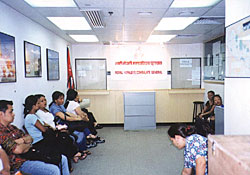 RAMYATA LIMBU |
"It seems I won't be able to come home except cramped in a coffin," she writes to Pourakhi, an NGO working for women migrant workers. Sabina is essentially a modern day slave.
Interestingly, she is one of the few women migrant workers to have used Kathmandu as a transit point. The Government of Nepal has banned the migration of women as domestic help. So Sabina submitted fake documents claiming she would be working in a hotel. The ban, in isolation, has done little to help women who are willing to risk all to join the Gulf rush. "Sabina writes to us and even calls asking for us to rescue her but there is no way we can help her," says Nirjala Bhattarai, director of Pourakhi.
Most Nepali women who become domestic workers in the Gulf use Delhi and Mumbai as transit points. They obtain passports from local agents who deliver them to prospective employers. Because of restrictive immigration-sponsorship policies that link their visas to their employers, these women have little freedom, even to return home. Employers sometimes withhold payment for months, even years, and confiscate their passports in an apparent effort to prevent them running away.
Mankumari Rawat (name changed) of Banke district flew to Saudi Arabia after returning to Nepal from a failed three-week stint in Kuwait. Things did not look good from the outset. She was picked up in Mumbai by her new Saudi employer, who told her outright, "You are not being hired just as domestic help." But the illiterate Rawat, who Pourakhi surmises had a history of mental illness and alcohol abuse, went ahead with the deal, hoping for the best.
Mankumari suffered psychological, physical and sexual abuse at the hands of her employer until she was dumped in the streets one day. Nepali workers who found her took her to the Nepali embassy. She was transferred to jail for a month pending preparation of travel documents, then deported to Nepal. She recalls having felt "safe" in jail.
Over 90 per cent of the estimated 2.6 million Nepali migrant workers in the Gulf and Malaysia are unskilled. The Department of Foreign Employment Promotion records show 232,965 people left last year, of which 4,642 were women. Government records show there are 20,000 Nepali women migrant workers abroad, but a report by the Nepal Institute for Development Studies (NIDS) claims the figure is closer to 70,000. They bring in over Rs 20 billion in remittance annually, 11 per cent of the total.
"Migrant worker remittances represent money the country is getting without investing in them at all," says Ganesh Gurung, foreign employment expert and President of the National Network for Safe Migration. "The government should invest in producing skilled manpower to compete in the world labour market."
The government has set up a Foreign Employment Promotion Board for the wellbeing of those migrant workers who have official permission to migrate for labour. A subsidised orientation course is available to provide information on the destination, workplace safety and labour rights.
The board has also come up with a rescue package for migrant workers who have lost their jobs to the recession. Of the paltry 224 workers who have claimed compensation, none were women. "It might be that women migrant workers work as domestic help, so they are the least affected," says Sthaneshwar Devkota, Executive Director of the board.
But to claim the package, a dismissal notice, a government labour permit and the recruitment agency's receipts are required. "Most of the women migrant workers sought illegal means because of the government's ban on domestic workers," says Bhattarai. "How can the government be so apathetic towards this problem when women make such a significant contribution to the national economy?"


